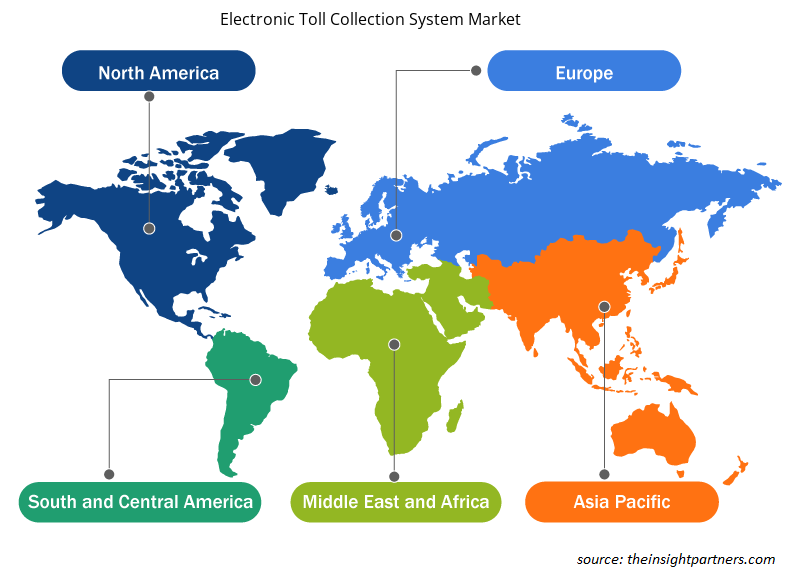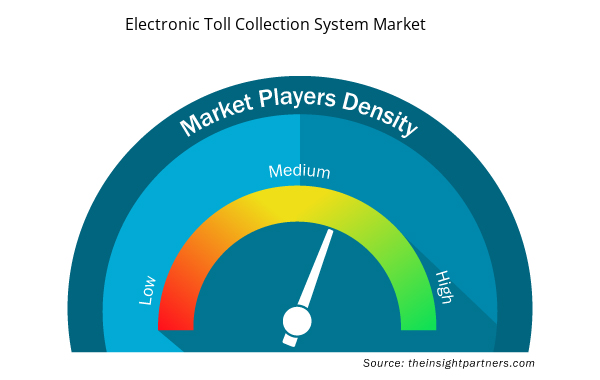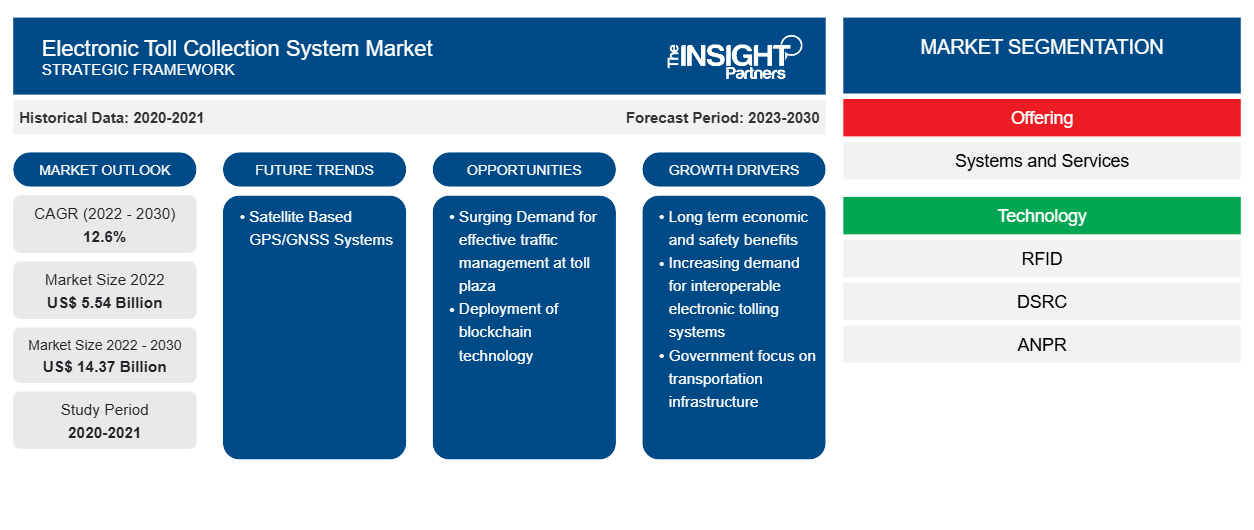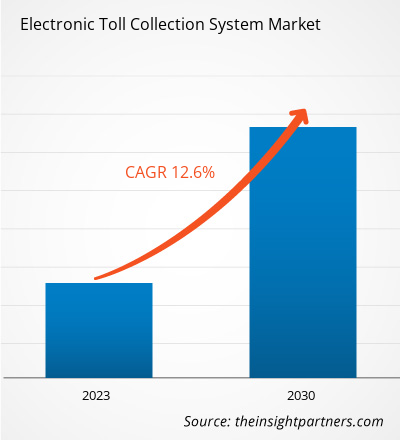[調査レポート] 電子料金収受システム市場規模は2022年に55億4,191万米ドルと評価され、2030年までに143億6,980万米ドルに達すると予想されています。電子料金収受システム市場は、2022年から2030年にかけて12.6%のCAGRを記録すると予想されています。
アナリストの視点:
時間の経過とともに、通行料徴収システムはインテリジェンスと効率の面で向上してきました。道路上に物理的設備を設置する必要がなくなるだけでなく、スマートな通行料徴収システムはデータをリソースとみなし、それを使用してキャッシュレス通行料のセキュリティと効率を向上させます。通行料は高速道路の建設と維持の両方の資金として使用できることから、通行料徴収は高速道路運営の重要な要素です。さまざまな検出および支払い技術を使用して徴収を効率的かつ時間節約にする電子通行料徴収は、ますます多くのケースで手動徴収に取って代わっています。
電子料金収受システム市場の概要:
道路、トンネル、高速道路での通行料徴収は、料金や税金を徴収し、官民連携のインフラプロジェクトや州政府機関の維持費の収入を生み出す効率的なソリューションであることが証明されています。徴収された通行料は、その後、高速道路、トンネル、橋の維持、プロジェクトの将来の拡張の資金調達、渋滞の管理など、さまざまな公共サービスに活用されます。さらに、登録車両数の最近の急増は、交通インフラの成長と比較して大幅に増加しており、渋滞を引き起こし、電子料金徴収 (ETC) システムの需要を生み出す可能性があります。渋滞の大幅な増加により、ゲートウェイでの通行料徴収に対する堅牢で効率的なアプローチが求められ、自動料金徴収システムの必要性が高まっています。電子料金徴収システム市場のソリューションは、自動料金徴収プロセスを促進するまとまりのあるユニットを形成するハードウェア機器とソフトウェアプログラムのセットで構成されています。ETC システムは、システム設計に従って、プリペイドユーザーアカウントから交通取引を効果的に識別、分類し、その後収集します。さらに、このシステムは、通行料金違反者への取り締まり、車両登録、バックオフィスサポート、渋滞管理、インテリジェント交通関連サービスなどのサービスも提供します。
ETC システムは、シームレスな通行料徴収プロセスの提供以外にも、渋滞管理、料金所の交通量の最小化、高速道路の車両交通量の削減、交通パターンに関する実用的な洞察の提供など、多様なメリットを提供します。これらのメリットにより、先進国ではシステムの人気が高まり、新興経済国ではシステムの需要が高まっています。さらに、長期的な経済的および安全上のメリットが、予測期間中に市場を牽引すると予想されます。高度なテクノロジーの統合と、それに続く ETC システム サービスの適用範囲の改善は、今後数年間の市場成長に大きな影響を与えると予測されています。
電子料金収受システム市場のソリューションは、交通を補助することで事故の可能性を減らすことができます。このシステムは、車載デバイスが料金を自動的に支払うのを助け、運用効率を高め、それによって顧客体験を向上させ、新しい相互運用性標準への移行に柔軟性を提供します。急速な都市化とスマート交通システムの採用の増加により、予測期間中に電子料金収受システム市場は称賛に値する後押しを受けるでしょう。
要件に合わせてレポートをカスタマイズする
このレポートの一部、国レベルの分析、Excelデータパックなど、あらゆるレポートを無料でカスタマイズできます。また、スタートアップや大学向けのお得なオファーや割引もご利用いただけます。
- このレポートの主要な市場動向を入手してください。この無料サンプルには、市場動向から見積もりや予測に至るまでのデータ分析が含まれます。
電子料金収受システム市場の推進要因:
政府の交通インフラへの注力により、電子料金収受システム市場の成長が促進される
Worldometerによると、世界の人口は毎年約0.88%のペースで増加しています。世界的な人口増加により、政府機関は増加する人口に対応し経済成長を維持するための効率的なインフラの構築に投資するよう促されています。老朽化したインフラの再構築とスマートソリューションの組み込みへの注目が高まっていることは、この地域の電子料金徴収システム市場でソリューションの採用を促進する重要な要因です。たとえば、2023年6月、欧州委員会は107の交通インフラプロジェクトを選択し、コネクティングヨーロッパファシリティ(CEF)から63億ドルを超えるEU補助金を受け取りました。また、ドイツ政府は、予想される貨物輸送の増加に対応するために道路容量を増やす予定です。Informareによると、2023年2月現在、ドイツの道路貨物輸送は2051年までに34%増加すると予想されており、ドイツ連邦政府はこの交通量の増加に対応するために新しい道路を建設することを目指していると運輸大臣は述べています。
2021年11月、議会は超党派インフラ協定を可決した。この協定に基づき、政府はアメリカの道路や橋の修復と再建に投資し、気候変動の緩和、回復力、公平性、そしてすべての利用者の安全に重点を置いている。また、政府は今後5年間で国内の劣悪な道路や高速道路を改革するために1,100億米ドルを投資した。さらに、米国大統領とカナダ首相の共同声明によると、2023年3月には、カナダ重要鉱物インフラ基金の下で、クリーンエネルギーと交通インフラプロジェクトを支援するために約10億9,000万米ドル(15億カナダドル)が投資される予定である。2022年9月のホワイトハウスのファクトシートによると、米国大統領とメキシコ大統領は、共通の戦略的経済・商業上の優先事項を推進するために、2021年に米国・メキシコハイレベル経済対話(HLED)を再開した。 HLED は、米国とメキシコが強固な経済関係を活用してメキシコの交通インフラの構築への投資を促進するためのプラットフォームを提供します。
このように、政府が交通インフラに重点を置くことで、道路建設、ソリューションの効率的なデジタル導入、老朽化したインフラの再構築が促進されました。これにより、収益漏洩のリスクを低減し、運用コストを削減し、交通渋滞を緩和することで通行料徴収システムを強化するのに役立つため、世界中の電子料金徴収システム市場でソリューションの導入が増加しています。
電子料金徴収システム市場セグメント分析:
提供内容に基づいて、電子料金収受システム市場はシステムとサービスに分類されます。システムセグメントは、電子料金収受システム市場で最大のシェアを占めています。電子料金収受システム市場のソリューションは、高速道路、橋、トンネル、車載車両、料金所ゲートウェイ上のさまざまなインフラストラクチャにインストールされるハードウェアとソフトウェアで構成されます。ハードウェア機器には、レーンハードウェアと料金所ハードウェアが含まれます。レーンハードウェアは主に、路側アンテナユニット、高速電気バリア、料金所レーンコントローラー、ETCレーン信号灯、レーン信号機、料金徴収用多機能ディスプレイ、レーン監視カメラ、車両検出器、スイッチ、コンピューターネットワークなどで構成されています。料金所ハードウェアには、主にスイッチ、ワークステーション、ETC料金所サーバーが含まれます。ETCシステムは一般に、トランスポンダー、アンテナユニット、信号受信機、料金所サーバー、光センサー、路上センサー、オーバーヘッドカメラ、路側通信ユニット、タグリーダーなどのハードウェア機器で構成されています。 ETC システムを効率的に機能させるには、料金所ゲートウェイに設置されたハードウェア機器と車両に搭載されたハードウェア機器の 2 つの側面が連携して動作する必要があります。この機器は、ソフトウェアとアルゴリズムが関連するデータと関連しないデータを分離するための入力データ ポイントを収集し、その後、料金所に関連する識別とトランザクションを実行する役割を担っています。
収集されたデータに基づいて、システムは必要な執行に取り組んだり、システム設計に従って適切な当局に警告したりすることができます。また、ソリューション プロバイダーは、地元のコンビニエンス ストアでの車載タグの利用、新しいユーザー アカウントの登録、および ETC システムがエラーなく機能するための関連するバック オフィス サポートを確保します。ソフトウェアは、データの取得とデータ通信に役立ちます。また、料金徴収システムの運用効率の向上にも役立ちます。
電子料金収受システム市場の地域分析:
北米の電子料金徴収システム市場規模は、2022年に19億5,636万米ドルと評価され、2030年までに54億1,754万米ドルに達すると予測されています。2022年から2030年にかけて13.6%のCAGRを記録すると予想されています。北米の電子料金徴収システム市場は、米国、カナダ、メキシコに分割されています。Assemblymanによると、2019年2月、国内有数のETCベースシステムであるE-ZPassには、17州にわたる電子料金徴収の2,100万アカウントを管理する3,500万を超える信号トランスポンダーがありました。さらに、卓越した料金徴収プログラムになるというビジョンを掲げるこのシステムは、世界最大の相互運用可能なETCシステムネットワークです。提携機関に約90億米ドルの収益をもたらします。拡張性、新車の登録、既存のETCシステムのメンテナンスなどの要因は、予測期間中の米国の電子料金収受市場の主要な推進力になると予想されます。また、効率的な渋滞管理と交通監視のための交通パターンに関する実用的な洞察を報告および収集するための分析の使用は、電子料金収受システム市場のソリューションを通じて統合できる革新的なサービスの余地を提供することが期待されており、市場プレーヤーに有利なビジネスチャンスを提供する可能性があります。さらに、米国全土で広く採用されているスマートシティイニシアチブの増加も期待されています。たとえば、2021年には、オクラホマターンパイク局のPikepassが米国の電子料金収受システム市場における最初のソリューションとなりました。このシステムは、停止する必要なく登録された自動車所有者の口座から電子的に引き落とすことができるため、料金所付近の渋滞が緩和されます。
電子料金収受システム市場の主要プレーヤー分析:
Conduent Business Services, LLC.、EFKON GmbH、Kapsch TrafficCom AG、Thales、TOSHIBA CORPORATION、TransCore、FAAC SpA、MITSUBISHI HEAVY INDUSTRIES, LTD.、SICE、P Square Solutions は、電子料金収受システム市場で事業を展開している主要企業です。
電子料金収受システム
電子料金収受システム市場の地域別分析
予測期間を通じて電子料金徴収システム市場に影響を与える地域的な傾向と要因は、Insight Partners のアナリストによって徹底的に説明されています。このセクションでは、北米、ヨーロッパ、アジア太平洋、中東およびアフリカ、南米および中米にわたる電子料金徴収システム市場のセグメントと地理についても説明します。

- 電子料金収受システム市場の地域別データを入手
電子料金収受システム市場レポートの範囲
| レポート属性 | 詳細 |
|---|---|
| 2022年の市場規模 | 55億4千万米ドル |
| 2030年までの市場規模 | 143.7億米ドル |
| 世界のCAGR(2022年 - 2030年) | 12.6% |
| 履歴データ | 2020-2021 |
| 予測期間 | 2023-2030 |
| 対象セグメント | 提供することで
|
| 対象地域と国 | 北米
|
| 市場リーダーと主要企業プロフィール |
|
電子料金収受システム市場のプレーヤー密度:ビジネスダイナミクスへの影響を理解する
電子料金収受システム市場は、消費者の嗜好の変化、技術の進歩、製品の利点に対する認識の高まりなどの要因により、エンドユーザーの需要が高まり、急速に成長しています。需要が高まるにつれて、企業は提供を拡大し、消費者のニーズを満たすために革新し、新たなトレンドを活用し、市場の成長をさらに促進しています。
市場プレーヤー密度とは、特定の市場または業界内で活動している企業または会社の分布を指します。これは、特定の市場スペースに、その規模または総市場価値と比較して、どれだけの競合相手 (市場プレーヤー) が存在するかを示します。
電子料金収受システム市場で事業を展開している主要企業は次のとおりです。
- コンデュエント株式会社
- カプシュ・トラフィックコムAG
- タレスSA
- 東芝インフラシステムズ株式会社
- TransCore LP、Magnetic Autocontrol GmbH
免責事項:上記の企業は、特定の順序でランク付けされていません。

- 電子料金収受システム市場のトップキープレーヤーの概要を入手
最近の動向:
合併や買収などの無機的および有機的な戦略は、電子料金徴収システム市場の企業によって広く採用されています。最近の主要な電子料金徴収システム市場の動向をいくつか以下に示します。
- 2023 年 4 月、Kapsch は自動ナンバープレート認識 (ANPR) ソフトウェア アップデートを開始しました。このアップデートでは、アプリケーションに応じて、ナンバープレートであるナンバー プレートを自動的に認識します。
- 2022年2月、グアテマラの高速道路運営会社SiVAは、同国の重要なパリン・エスクイントラ有料道路回廊に沿って、タレスのPeage Intelligent Transport Zero(PITZ)電子料金収受システムを導入すると発表しました。
- 過去2年間の分析、基準年、CAGRによる予測(7年間)
- PEST分析とSWOT分析
- 市場規模価値/数量 - 世界、地域、国
- 業界と競争環境
- Excel データセット



Report Coverage
Revenue forecast, Company Analysis, Industry landscape, Growth factors, and Trends

Segment Covered
This text is related
to segments covered.

Regional Scope
North America, Europe, Asia Pacific, Middle East & Africa, South & Central America

Country Scope
This text is related
to country scope.
よくある質問
The electronic toll collection market is expected to reach US$ 14369.80 million by 2030.
North America is anticipated to grow with the highest CAGR over the forecast period.
The systems segment led the electronic toll collection market with a significant share in 2022 and it is also expected to grow with the highest CAGR.
Satellite-based GPS/GNSS systems is expected to drive the growth of the electronic toll collection market in the coming years.
The electronic toll collection market was estimated to be valued at US$ 5541.91 million in 2022 and is projected to reach US$ 14369.80 million by 2030; it is expected to grow at a CAGR of 12.6% during the forecast period.
Long-term economic and safety benefits, and increasing demand for interoperable electronic tolling systems, are driving factors of electronic toll collection market.
The key players holding majority shares in the electronic toll collection market include Kapsch TrafficCom AG, Mitsubishi Heavy Industries, LTD., Conduent Business Services, LLC., and TransCore.
Trends and growth analysis reports related to Electronics and Semiconductor : READ MORE..
The List of Companies - Electronic Toll Collection Market
- Conduent Inc
- Kapsch TrafficCom AG
- Thales SA
- Toshiba Infrastructure Systems and Solutions Corp
- TransCore LP, Magnetic Autocontrol GmbH
- The Revenue Markets Inc
- Sociedad Iberica de Construcciones Electricas SA
- P Square Solutions LLC
- Verra Mobility Corp
- Mitsubishi Heavy Industries Ltd.
- Cubic Transportation Systems, Inc.
- Q-Free ASA.
The Insight Partners performs research in 4 major stages: Data Collection & Secondary Research, Primary Research, Data Analysis and Data Triangulation & Final Review.
- Data Collection and Secondary Research:
As a market research and consulting firm operating from a decade, we have published and advised several client across the globe. First step for any study will start with an assessment of currently available data and insights from existing reports. Further, historical and current market information is collected from Investor Presentations, Annual Reports, SEC Filings, etc., and other information related to company’s performance and market positioning are gathered from Paid Databases (Factiva, Hoovers, and Reuters) and various other publications available in public domain.
Several associations trade associates, technical forums, institutes, societies and organization are accessed to gain technical as well as market related insights through their publications such as research papers, blogs and press releases related to the studies are referred to get cues about the market. Further, white papers, journals, magazines, and other news articles published in last 3 years are scrutinized and analyzed to understand the current market trends.
- Primary Research:
The primarily interview analysis comprise of data obtained from industry participants interview and answers to survey questions gathered by in-house primary team.
For primary research, interviews are conducted with industry experts/CEOs/Marketing Managers/VPs/Subject Matter Experts from both demand and supply side to get a 360-degree view of the market. The primary team conducts several interviews based on the complexity of the markets to understand the various market trends and dynamics which makes research more credible and precise.
A typical research interview fulfils the following functions:
- Provides first-hand information on the market size, market trends, growth trends, competitive landscape, and outlook
- Validates and strengthens in-house secondary research findings
- Develops the analysis team’s expertise and market understanding
Primary research involves email interactions and telephone interviews for each market, category, segment, and sub-segment across geographies. The participants who typically take part in such a process include, but are not limited to:
- Industry participants: VPs, business development managers, market intelligence managers and national sales managers
- Outside experts: Valuation experts, research analysts and key opinion leaders specializing in the electronics and semiconductor industry.
Below is the breakup of our primary respondents by company, designation, and region:

Once we receive the confirmation from primary research sources or primary respondents, we finalize the base year market estimation and forecast the data as per the macroeconomic and microeconomic factors assessed during data collection.
- Data Analysis:
Once data is validated through both secondary as well as primary respondents, we finalize the market estimations by hypothesis formulation and factor analysis at regional and country level.
- Macro-Economic Factor Analysis:
We analyse macroeconomic indicators such the gross domestic product (GDP), increase in the demand for goods and services across industries, technological advancement, regional economic growth, governmental policies, the influence of COVID-19, PEST analysis, and other aspects. This analysis aids in setting benchmarks for various nations/regions and approximating market splits. Additionally, the general trend of the aforementioned components aid in determining the market's development possibilities.
- Country Level Data:
Various factors that are especially aligned to the country are taken into account to determine the market size for a certain area and country, including the presence of vendors, such as headquarters and offices, the country's GDP, demand patterns, and industry growth. To comprehend the market dynamics for the nation, a number of growth variables, inhibitors, application areas, and current market trends are researched. The aforementioned elements aid in determining the country's overall market's growth potential.
- Company Profile:
The “Table of Contents” is formulated by listing and analyzing more than 25 - 30 companies operating in the market ecosystem across geographies. However, we profile only 10 companies as a standard practice in our syndicate reports. These 10 companies comprise leading, emerging, and regional players. Nonetheless, our analysis is not restricted to the 10 listed companies, we also analyze other companies present in the market to develop a holistic view and understand the prevailing trends. The “Company Profiles” section in the report covers key facts, business description, products & services, financial information, SWOT analysis, and key developments. The financial information presented is extracted from the annual reports and official documents of the publicly listed companies. Upon collecting the information for the sections of respective companies, we verify them via various primary sources and then compile the data in respective company profiles. The company level information helps us in deriving the base number as well as in forecasting the market size.
- Developing Base Number:
Aggregation of sales statistics (2020-2022) and macro-economic factor, and other secondary and primary research insights are utilized to arrive at base number and related market shares for 2022. The data gaps are identified in this step and relevant market data is analyzed, collected from paid primary interviews or databases. On finalizing the base year market size, forecasts are developed on the basis of macro-economic, industry and market growth factors and company level analysis.
- Data Triangulation and Final Review:
The market findings and base year market size calculations are validated from supply as well as demand side. Demand side validations are based on macro-economic factor analysis and benchmarks for respective regions and countries. In case of supply side validations, revenues of major companies are estimated (in case not available) based on industry benchmark, approximate number of employees, product portfolio, and primary interviews revenues are gathered. Further revenue from target product/service segment is assessed to avoid overshooting of market statistics. In case of heavy deviations between supply and demand side values, all thes steps are repeated to achieve synchronization.
We follow an iterative model, wherein we share our research findings with Subject Matter Experts (SME’s) and Key Opinion Leaders (KOLs) until consensus view of the market is not formulated – this model negates any drastic deviation in the opinions of experts. Only validated and universally acceptable research findings are quoted in our reports.
We have important check points that we use to validate our research findings – which we call – data triangulation, where we validate the information, we generate from secondary sources with primary interviews and then we re-validate with our internal data bases and Subject matter experts. This comprehensive model enables us to deliver high quality, reliable data in shortest possible time.


 このレポートの無料サンプルを入手する
このレポートの無料サンプルを入手する